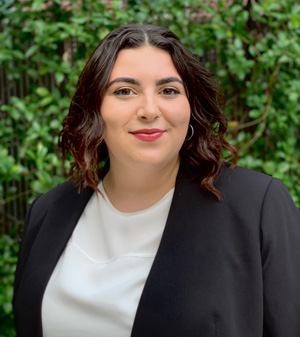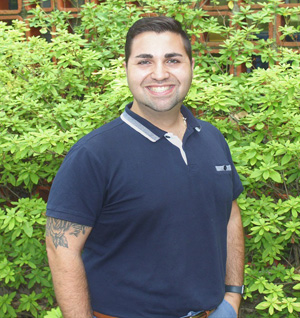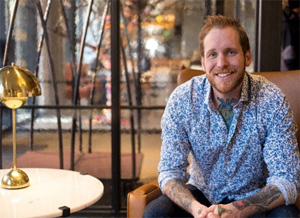Student Spotlight: Christina Krisberg

Everyone has defining moments in their college career. Oftentimes, you don’t even know that one is happening until it’s over. At least, that’s how it happened for me. Almost three years ago, I attended the Undergraduate Sexual Violence Town Hall as a first year student trying to complete her potential new member education requirement. I didn’t know that in that one event I would find the passion that defined the rest of my time at Tulane. After hearing from the committed, engaged panelists on the important work they were doing to fight sexual violence at Tulane, I knew that I had to get involved. If you told me the night of my first town hall three years ago that I would be planning the 2019 Town Hall, I’m not sure that I would have believed you.
This year, I have the honor of serving as the first USG Director of Sexual Violence Prevention and Response. USG President Joseph Sotile, established this new position to centralize sexual violence prevention efforts in student government. I have been able to work alongside Joseph to assemble a committee of over 20 passionate students from all corners of campus. The committee works closely with campus partners such as Title IX, Student Conduct, Campus Health, and Student Affairs to voice student concerns and advocate for student initiatives. This year, one of our goals is to create an accessible, collaborative environment that connects the voices of all students to the professional staff dedicated to sexual violence prevention and response on campus.
So far this semester the USG Sexual Violence Prevention and Response committee has been focused on planning the 2019 USG Sexual Violence Town Hall. The Town Hall will take place on October 15th from 6:30PM-8:30PM in LBC Qatar Ballroom. This year, the night will be split into two parts. The first hour will be a Q+A panel of student leaders and professional staff, and the second hour will be focused roundtable discussions. The event will be a space where students can share not only their concerns, but also their ideas. Students can pre-submit questions for the Q+A panel here. I hope that starting these important conversations with administrators empowers students to harness the power of their voice on this campus, and in this work.
Student involvement and dedication to sexual violence prevention has been crucial as we start to change the culture on this campus. The progress Tulane has made would not be possible without the several organizations dedicated to this work on campus. None of the work that my committee or I do would be possible if student activists had not been so dedicated to keeping the conversation alive on campus. I am so thankful to those students that tirelessly work for the benefit of the Tulane Community.
Tulane has come a long way in sexual violence prevention from that one town hall over three years ago. We took the climate survey. We mourned the results. We released a plan of action. We got to work implementing the first set of prevention efforts. But we’re still learning the best way to fight this problem. If there’s anything that I’ve learned doing this work, it’s that no one can do it alone. Not one person. Not one organization. Not one office. If we really want to make a lasting impact at Tulane, then we need everyone’s support. Every student, every staff member, every faculty person. If you’re reading this, we need you to stand with us. To stand against sexual violence. We need everyone to be All In.
The annual USG Sexual Violence Town Hall will take place on Tuesday, October 15th from 6:30PM-8:30PM in the LBC. The first hour will be a Q+A panel in Qatar, and the second hour will be a series of roundtable discussions in Stibbs. All are welcome. Pizza will be provided. Contact ckrisber@tulane.edu with any questions about the event.
Men’s Engagement Update: Anthony Ciliberto

Here at Tulane, we are excited to expand our opportunities for men’s engagement programming. This expansion is a necessity for our campus, helping to contribute to a healthier, more inclusive culture and community. I joined the team as a Health Promotion Specialist (HPS) for The Well for Health Promotion last spring, focusing my work on men’s engagement, sexual violence prevention, healthy relationships, and community outreach. Combining my experiences working in Health Promotion, specifically power- based personal violence prevention education, Fraternity & Sorority Life, and New Student & Family Programs, I’m able to create innovative, student-centered programs. The MENtality Project, a newly developed initiative, serves as the umbrella for men’s engagement programming. The MENtality Project is a program designed to engage, educate, and empower ALL students on topics centered around healthy masculinity and violence prevention. The project utilizes a three-pillar framework developed around mentorship, engagement, and networking (MENtality), to encompass various programmatic efforts to connect students to education and resources.
Outreach and education are strategically designed to engage students through workshops, lunch & learns/dine & discussions, cohort model programming, mentoring programs, and guest speakers. We recently launched The MENtality Project lunch & learns and requestable workshops that will provide students with fundamental knowledge of healthy masculinity and violence prevention. Tim Mousseau, author, artist, and keynote speaker will be visiting both the Downtown and Uptown campuses on November 13th to facilitate his discussion entitled Mo-Men-Tum: Changing The Landscape of Modern Masculinity. We are excited to move forward with a cohort model program next semester, followed by mentoring opportunities throughout the year. Through The MENtality Project, I have created the role of Men’s Engagement Coordinator, a student position that will work directly with myself and campus partners on various initiatives to improve and increase conversations around healthy masculinity, violence prevention, and inclusion.
Given its complexity, The MENtality Project is grounded in several student development theories and behavioral change models, all designed to increase student interaction and measure change at the individual, communal, and societal levels. Theories and change models include the Social-Ecological Model (Bronfenbrenner, 1979), Challenge & Support Theory (Sanford, 1967), Theory of Self-Authorship (Baxter-Magolda, 2001), Social Learning Theory (Bandura,1977), and the Theory of Planned Behavior (Ajzen, 1980).
To support these efforts, The Well for Health Promotion has brought on a student coordinator focusing on men’s engagement. This position will work directly with professional staff to aide in the development, implementation, and evaluation of programming and outreach materials. As we continue to build out the men’s engagement programming for the coming academic semesters, we want to hear from you! My door is always open.
Get Involved with the Student Coalition
Are you interested in getting involved with sexual violence prevention work at Tulane? Tulane has two coalitions that are open to all students to work on student-led initiatives and collaborate with other students, student organizations, and university staff. The Student Coalition for Sexual Violence Prevention and Response meets monthly on the uptown campus and focuses on the undergraduate student population. Email Julia Broussard at jbrouss@tulane.edu for more information. The Sexual Violence Prevention Coalition: Graduate and Professional Students meets regularly on the downtown campus and focuses on the graduate and professional student population. Email Margaret Reynolds at mreynol1@tulane.edu for more information.
Faculty Spotlight: Tulane’s Violence Prevention Experts offer Spring Courses
Registration for Spring 2020 course begins on November 4th. As you begin to plan your class schedule, consider taking a course that examines sexual violence and related issues in your discipline of study. Tulane’s Violence Prevention Institute brings together faculty experts from across academic departments who are examining the causes and consequences of various types of violence as well as strategies for reducing and eliminating violence locally and globally. The Violence Prevention Institute maintains a list of violence-related courses at Tulane at both the undergraduate and graduate levels. We encourage you to take a look at the list and to explore the Violence Prevention Institute’s website to learn more about our faculty’s work.
What We Are Reading and Watching
The reality of male victims of sexual violence is rarely depicted in popular culture. The Pop Culture Detective takes a look at a variety of TV shows and movies to demonstrate how media often plays male sexual assault as a joke. These media depictions serve to both obscure the real problem of rape and to invalidate the experiences of victims. In one exception to this rule, the second season of the anthology series American Crime tells the story of a high school boy who said he was raped by the two co-captains of his school's basketball team. Though it has soapy twists and turns, the show dives deep into the shame and stigma around male survivors of sexual assault, as well as the power that assailants have over their victims and how that impacts a victim's choices. Similarly, the New York Times recently published a powerful profile of several male military victims of sexual assault. These poignant portraits powerfully illustrate the pain and stigma that male victims often struggle with.
Upcoming Events

Featured Event
Tim Moussaeu presents Mo-Men-Tum: Changing the Landscape of Modern Masculinity
November 13th, 2019
Downtown Event
12:00 p.m. | Diboll Auditorium (1st Floor Tidewater)
Free Lunch for participants
Uptown Event
7:00 p.m. | Freeman Auditorium (Woldenberg Art Center)
Meet & Greet for Student Leaders
Mo-Men-Tum: Changing the Landscape of Modern Masculinity
What makes a man? And what makes a man masculine? These are both questions that pop culture, society, academics, communities, and individuals across the world have been attempting to answer for years. When it comes to masculinity, our conversation is anything but binary. Even with the ever-fluctuating meaning of the term masculinity, Tim Mousseau is convinced of one thing: students want to have conversations on what defines manhood. Even more, they want to understand what it means to express this idea in a positive way.
In this keynote, Tim leads a vulnerable conversation about exploring his masculinity as a male survivor and how traditional values and tropes or masculinity often influence our perceptions. By digging deep into the topics surrounding identity and self-creation, students can clearly see the difference between healthy vs. toxic masculinity.
By connecting personal stories to the audience and giving them a voice, Tim will leave a lasting impact on your students. This program is meant to challenge perceptions while building a welcoming dialogue where everyone can participate
Other Events
MENtality Project Lunch & Learns
Oct. 15, Oct. 22, Nov. 5, and Nov. 12 | 12:30-1:30 p.m.
Registration is required for these events. Please visit the Campus Health WaveSync page.
Annual USG Town Hall on Sexual Violence
October 15 | 6:30-8:30 p.m.
Qatar Ballroom, Lavin-Bernick Center
Take Back The Night
October 24 | 5:45 p.m.
Horseshoe Parking Lot, Loyola University
Fridays at Newcomb: Antiblackness and the Politics of Pleasure
October 25 | 12:00-1:00 p.m.
Diboll Gallery, Commons 3rd Floor
True Tea with Kat Blaque
October 29 | 6:00- 8:00 p.m.
Diboll Gallery, Commons 3rd Floor
